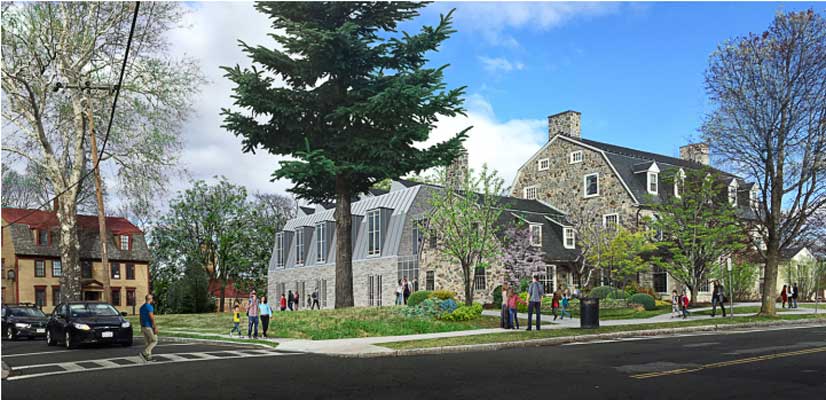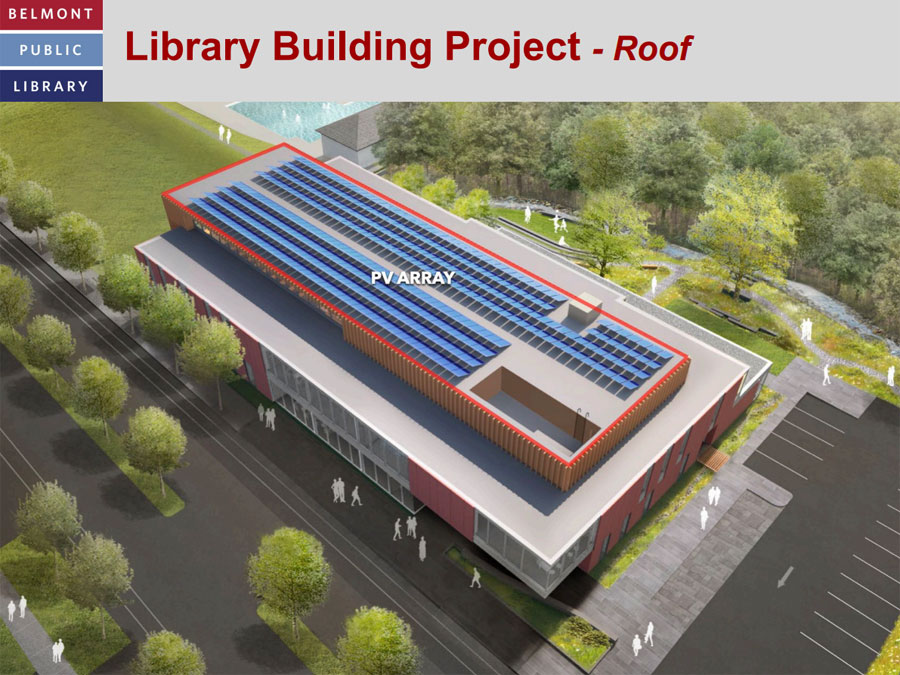Belmont Shows How to Constrain Library Project Costs

Photo: https://www.joneslibrary.org/
Wealthy Boston Suburb’s Project Planning and Decision-making May Offer Lessons to Amherst
Like Amherst, the town of Belmont, Mass., an affluent suburb northwest of Boston, is in the final stages of a library construction project. Despite supporting a greater book circulation than the Jones Library and enjoying vastly greater financial resources, Belmont has managed to limit the size and constrain the cost of its brand-new building.
The challenges encountered by the $46.1 million Jones Library renovation-expansion have been widely reported. A comparison of Belmont’s planning processes and design decisions may provide Amherst with some useful lessons.
Belmont Public Library, with the 8th highest circulation in the state, has operated out of a building of 29,650 sq. ft. which is almost 20,000 sq. ft. smaller than the current Jones Library. Belmont’s population of 27,295 is smaller than Amherst (39,263), but if you exclude Amherst’s 23,000 students who have academic libraries of their own, Belmont is considerably larger.
From the get-go Belmont worked hard to include the community in determining the scope of the proposed construction project. After 7 public charettes, the town settled on building a new 40,460 sq. ft. library over the footprint of its old library. Belmont was satisfied that its busy new library would function well despite being 7,500 sq. ft. smaller than the current Jones Library.
The resulting project was estimated to cost $39.5 million, or $6.6 million less than the Amherst plan. The local library foundation pledged to kick in $5 million. In November 2022 Belmont voted to fund the project with a debt exclusion.
By contrast, Amherst residents had virtually no input into the size of a renovation-expansion project that a small Library Feasibility Committee proposed when it applied to the Massachusetts Board of Library Commissioners (MBLC) for a construction grant. The committee went big, proposing to demolish the 1993 addition to the Jones Library and enlarging the building to 65,000 sq. ft. at a cost estimated at the time to be $35.6 million.
Rather than embracing Open Government to the MAX, the Feasibility Committee chose to operate under the radar. Remarked Board of Trustees President Austin Sarat to the group, “We have a problem because many people say, ‘What’s wrong with the Library?’ Also, as a requirement of the grant proposal, we need to consider alternative sites. It was not well received at Town Meeting. We won’t talk about it, but parking is a big problem.”
The MBLC eventually awarded Amherst a $13.8 million library construction grant – the largest in its history. The downside was that it also represented the largest municipal liability for a state-supported library project in history. Few in town then realized how financially burdensome this liability would become.
Interestingly, Belmont chose not to pursue an MBLC grant. While this resulted in the town possibly missing out on grant money, it had some advantages. The MBLC grant process is rigid and time-consuming. The Library Commissioners are strict about features they want to see in a library design such as expanded programming areas and long sight lines. It can take several years for a library to complete the MBLC review process and once a grant is awarded, the design is not permitted to significantly change. This proved devastating in Amherst where costs skyrocketed by $10 million, but neither the library’s programs nor proposed size were allowed to be reduced. The MBLC’s rigidity and required commitment of town funds is a major reason why one-third of 33 grant-supported libraries have canceled their construction plans since 2016.
Belmont appears to be spending within its means. U.S. News & World Report ranks Belmont High School eighth best in Massachusetts, and the town finished building a new $295-million middle and high school in 2023. For the next two-to-three decades Amherst taxpayers will be challenged to pay for a new $97 million elementary school while at the same time funding the costliest library project in Massachusetts.
A side-by-side comparison of the Amherst and Belmont Library projects
| Amherst | Belmont | |
| Population | 39,263 (17,000 non-students) | 27,295 |
| Library last renovated | 1993 | 1965 |
| Current size in square ft | 48,000 | 29,650 |
| Print books circulation | 260,118 | 381,081 |
| Circulation per capita | 16.55 | 23.04 |
| Current # of meeting rooms | 4 | 2 |
| Project type | Demolition-renovation-expansion | Demolition-new building |
| Total project cost | $46.1 million | $39.5 million |
| Construction Cost | $35,500,000 | $30,000,000 |
| Space being added | 15,000 sf | 10,960 sf |
| Final size | 63,000 | 40,460 |
| Parking at new building | 7 | 45 |
| Library feasibility study | 2014-15 | 2016-17 |
| Pre-design public forums | None | 7 |
| Building Committee formed | 2021 | 2018 |
| Architect | Finegold Alexander Architects | Oudens Ello Architecture |
| Registered historic property | Yes | No |
| Solar panels on roof | No | Yes |
| Appropriation approved | April 2021 | November 2022 |
| Appropriation increased | December 2023 | No |
| Capital Campaign goal | $13.8 million | $5 million |
| Construction bid period | Jan 10 – Apr 16, 2024 | Feb 12 – Mar 20, 2024 |
| Groundbreaking scheduled | June 2024 | April 2024 |
| MBLC grant awarded | Yes, $15.5 million | No |
| Other capital projects | Concurrent new $97 million elementary school | New $295 million Middle/High School completed in 2023 |
| Town revenue per capita | $2568 | $5314 |
| Town income per capita | $20,969 | $116,207 |
| Town tax levy | $64.2 million | $119.4 million |
| Type of government | Town Council/Town Manager | Town Meeting |
| Library project info | Jones Library Building Project | Belmont Library Building Project |
| Construction bid info | Jones Library BidDocs | Belmont Library BidDocs |


Amherst and Belmont: night and day….
Thanks for the easy to use comparison chart.